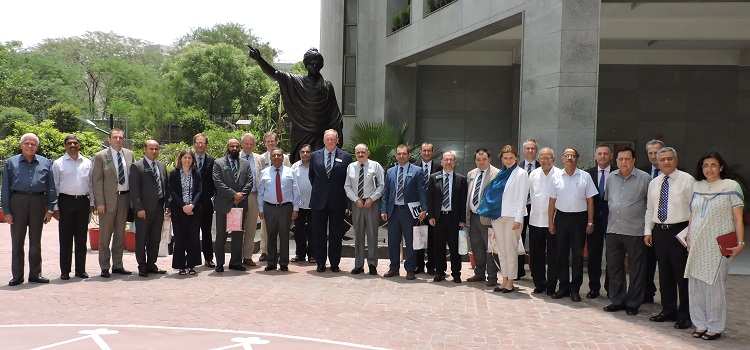An eighteen-member delegation from the Royal College of Defence Studies (RCDS), led by Major General Simon Leslie Peters, visited the VIF on 08 Jun, 2016 for an interaction that focused, among other things, on India’s foreign policy imperatives amidst the rise in multispectral threat scenario across the region and beyond.
General NC Vij, Director, VIF began the session with his opening remarks, underlining specific threats and challenges India faces even as the country’s foreign policy initiatives remain economy-centric. General Vij, however, maintained that India needs a secure and stable environment for its economy to grow. He stressed further the evolving situation in the Middle East and Afghanistan, Pakistan-sponsored terrorism in Afghanistan and India, China’s territorial ambitions extending to the seas, the looming specter of sea-borne terrorism, the rising tide of sea piracy increasingly to the eastern Indian Ocean, the presence of extra-regional navies – submarines, in particular, in the Indian Ocean, among others, have impacted negatively on the region’s security environment adding to India’s concerns.

The Director, however, felt that that India’s current approach to its foreign policy lies in mitigating some of these challenges while re-positioning India’s as a global economic power-house. Appreciating the growing trajectory in bilateral relationship between the UK and India across a range of areas, the Director underlined joint action by friendly and democratic countries as need of the hour to combat common and global security challenges. The Director also underpinned India’s role as a net security provider in the region, a role bestowed upon India by geography, especially in the Indian Ocean Region.
As a follow up to the Director’s opening remarks, detailed presentations were made on all of the above by a panel of three experts – Amb Ashok Kantha, India’s former Ambassador to China, Lt Gen R K Sawhney, formerly DGMI and currently Dean, Center for Defence Studies, VIF, and Cmde Gopal Suri, an expert in maritime affairs.
Amb Kantha stressed that India’s outreach to countries in the region and beyond is primarily driven by economic priorities. It is the same concern for the economy that is driving India’s policies towards China notwithstanding the fact that bilateral relationship with China has remained mired in mistrust, arising out of an unsettled border. The Ambassador however rued that a similar approach towards Pakistan hasn’t worked well for India. Part of a clue to the jigsaw puzzle on Pakistan came from the Director himself, who quipped during the Q&A session that Pakistan has a problem of mindset that is obstructing peace between the two neighbours.
Lt Gen RK Sawhney, an avid watcher of developments in Afghanistan who rarely misses an opportunity to champion the cause of Afghanistan's National Army, asserted that India's involvement in Afghanistan is totally in sync with global efforts to stablise Afghanistan, a country that is currently passing through three critical transitions in history – political, economic and military. While he stressed that a regional and global approach is needed to help Afghanistan come into its own, he also cautioned Afghanistan risks loosing gains accrued to it after decades’ of efforts by coalition and willing partners should the country be allowed to lapse into Pakistan’s strategic backyard yet again. Referring to the recently concluded port agreement between India, Iran and Afghanistan, the General said it has provided Afghanistan with an option, more specifically, an access away from Pakistan to the oceans and to the markets in Central Asia. More such initiatives are needed to lift Afghanistan from the morass it has landed in.
Cmde Gopal Suri, Senior Fellow, VIF, in his presentation, touched on maritime dimensions to India’s security. While he expressed India’s concerns at attempts being made by foreign navies, especially China’s, to build and revamp ports and bases around the crucial chokepoints in the Indian Ocean, he also apprised the visiting delegation of India’s renewed focus on the maritime domains, reflected by initiatives such as MAUSAM and SAGAR along with improving ties with littoral countries, parts of initiatives to keep the Indian Ocean safe for maritime transport. He reiterated India’s role as a net security provider in the Indian Ocean. A vigorous Q&A session followed the presentations.





